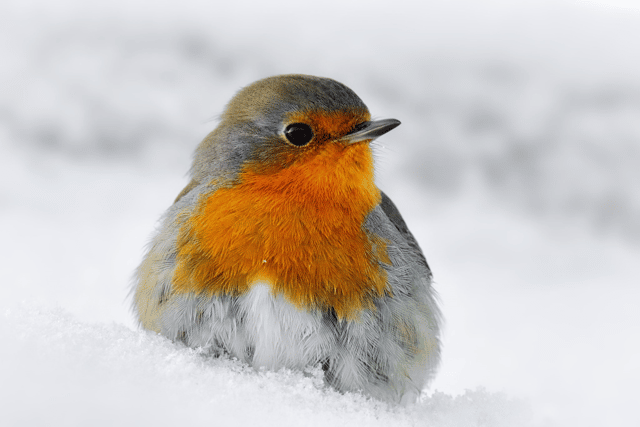Robin respite: Wildlife expert urges UK public to help save robins from freezing temperatures this Christmas
and live on Freeview channel 276
Red-breasted robins may be a Christmas icon, but the icy winter season is anything but easy for the tiny birds - and wildlife experts say they need all of the help they can get.
Days of below-freezing temperatures, frosty nights and even snowfall in early December, were followed up with heavy rain and flood warnings this week. The Met Office has also issued a number of severe weather warnings for Saturday (8 December), with more rain and gale-force winds expected across large parts of England, Scotland, Wales, and Northern Ireland. Wildlife experts are now warning so much extreme weather can spell bad news for robins, which flock to the UK in greater numbers over the winter as food supplies in Northern Europe dry up.
Advertisement
Hide AdAdvertisement
Hide AdA robin can use up to 10% of its body weight to keep warm on a single winter night, so unless it can replenish its reserves every day, a cold spell can prove fatal. This is particularly hard for them, because shorter days cuts back foraging time to eight hours or less, compared to over 16 hours during the summer. British Trust for Ornithology research has shown that small birds must spend over 85% of daylight hours just foraging for food to be able to consume enough calories to survive the long night.
Ark Wildlife, a company which specialises in garden wildlife feeds and products, is now warning that without supplementary bird feeding in gardens, up to half of the UK's robins are at risk of dying of cold and starvation. Robins are particularly susceptible, as they remain faithful to their garden homes no matter what the weather, director and wildlife expert Sean McMenemy says.
Here is his list of top tips to help robins in your garden this Christmas.


How to make your winter garden robin-friendly:
1. Provide some extra food for them
Mr McMenemy says some of the best foods for robins are fatty foods like suet pellets, dried fruit, mealworms and calci worms (these are especially beneficial because robins are insectivores), special high-protein robin blends, peanuts (shredded or crushed), meaty kitchen scraps, mild cheese, and cake and biscuit crumbs.
Advertisement
Hide AdAdvertisement
Hide AdRobins prefer to forage and feed off the ground, he said. To encourage them to spend more time with you and make your garden a home, place a small tray full of their favourite foods close to a shrubby tree, or preferred perch. "If you’re lucky, robins can quickly become confident in our presence and feeding from the hand is not unknown," he added.
2. Provide shelter
During icy spells, birds cluster together to share their warmth. They often use nest boxes as winter shelters, so putting up robin nest boxes can make a huge difference, Mr McMenemy says. The boxes will be used as night roosting sites in winter, and places for nesting in the spring. He advises that you place nest boxes at least two metres from dense vegetation, in order to prevent attacks from predators.
3. Make sure they have a source of water
Placing plenty of water sources in your garden can make a big difference to survival rates in urban and suburban areas, the Ark Wildlife director says. You can prevent water from freezing by placing a ping pong ball in a bird bath. Alternatively, the company's ice free for bird baths slows the freezing process down to -4C, keeping water liquid for longer.
4. Rewilding
Making sure your garden isn’t too pristine or tidy can actually be a big help to wildlife. Some wild undergrowth will keep insect numbers up, and help robins - and other birds - find food this winter.
Comment Guidelines
National World encourages reader discussion on our stories. User feedback, insights and back-and-forth exchanges add a rich layer of context to reporting. Please review our Community Guidelines before commenting.
